#Greek Goddesses
Explore tagged Tumblr posts
Text

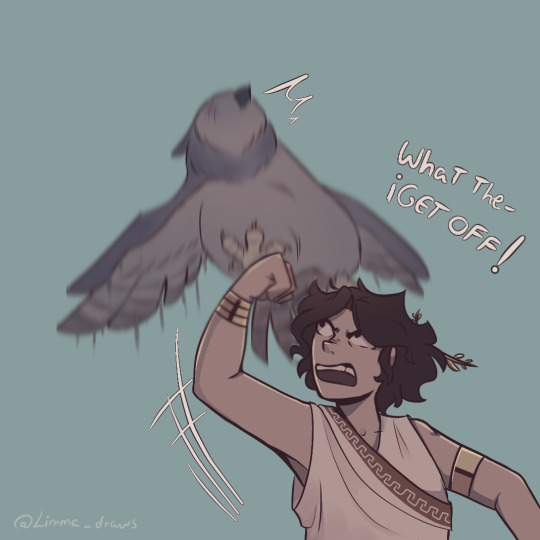

/Spanish/
Atenea: Odiseo! Odiseo! Odiseo!
Odiseo: Que-?! QUÍTATE!I
Odiseo: A-Atenea!
Y murió... jaja
/ already posted this in my yt comunity, but not here so... xd/
#epic the musical#epic odysseus#epic athena#athena#odysseus#greek mythology#greek goddesses#young odysseus
11K notes
·
View notes
Text
In ancient Greece:
Boys and men worshipped Artemis, she had priests as well as priestesses.
Maidens, married women, and mothers worshipped Artemis. Her cults were not for girls and virgins only.
Artemis was a goddess of transitions, of the constant moving states of being, of the process of going through the stages of life; she helped her worshippers be born, grow up, get married, become parents, grow old. In this manner, she presided over virginity as well as the inevitable loss of it as one left childhood behind and entered adulthood.
#artemis#artemis devotee#artemis devotion#daughter of artemis#hellenic polytheism#hellenic pantheon#ancient greece#greek goddesses#greek history
602 notes
·
View notes
Text
Another reminder that Greek mythology is always somehow symbolic, metaphorical, allegorical, since we are dealing with anthropomorphic personifications and other embodiments of cosmic powers.
For example: Demeter has sex with both Zeus and Poseidon. Something-something about the relationship of the Earth with the Sky and the Sea (or the celestial and chthonian powers). ESPECIALLY since these relationships are said to happen at the beginning of the world, in the primordial times during which the world settled itself for what it is now.
Herakles' wedding with Hebe, the personification of youth, checks in with when he becomes an immortal god (aka, an eternally young entity). What better way to symbolize a hero escaping the clutches of death than by him becoming the husband of the spirit of eternal youth?
Why is Hestia never leaving Olympus? Something-something about her being the literal personification of the hearth, which is at the center of the house/community and does not move.
Why is Ares getting his ass kicked by Athena? Because Athena is civilization, and Ares savagery, and in the Ancient Greek mindset intelligence, wisdom and craft will always be above brutality, bloodlust and random cruelty.
Do I need to spell it out that the myth of Persephone-Hades-Demeter is about the cycle of the seasons, and how the earth renews itself and brings back life after a time of death?
And I wonder why Ares' companions during his mass-slaughters are called Phobos, Deimos and Eris - Fear, Panic and Discord... Why would the goddess that breaks harmony and sows feuds and chaos be depicted as the close sister of the god of the ravages of war and of the brutality of conflicts, what a strange mystery!
And I can go on, and on, and on. Remember, the Greek gods aren't just super-heroes or wizards (that's more in line with more "humanized" mythologies, like the Irish or Nordic ones). They are embodiments of concepts and ideas, personifications of natural forces and cosmic powers, they are living allegories and fleshed metaphors. Zeus wields the lightning because he IS the lightning and thunder. Dionysos is both the bringer of joy and madness because he IS alcohol. Hades is both the name of the god of the dead, and of the realm of the dead. Hestia's name is literaly "hearth" in Greek, Hebe "youth", Nyx "night", Gaia "earth", Eros "desire". You can write "Eris met Helios at Okeanos' palace" or you can write "Strife encountered the Sun at the palace of Ocean" and that is the EXACT SAME THING!
[Mind you to limit the gods to being JUST allegories is also a mistake not to make. Greek deities are much more than just X concept or X idea... But one part of the myths will always be, down the line, some weather metaphor or some natural cycle motif]
#greek mythology#greek gods#this is also for almost all other mythologies in the world#but we'll stick with greek for now#greek goddesses#greek myths
1K notes
·
View notes
Text
Friendly reminder that you don't need to be on any “level” of witchcraft to worship the Hellenic gods because
1. Being a polytheist or a pagan doesn't equal being a witch.
2. These deities were worshipped by literal children back then as there was no fear of them being harmed.
If someone is telling you “this deity is for beginners/advanced practitioners/whatever” then they're either misinformed or they're purposefully trying to seem spiritually above you so you consider them as some sort of spiritual guide.
#this doesnt apply to certain rites its just about worship in general#paganblr#paganism#hellenic polytheist#hellenic polytheism#hellenic worship#hellenic gods#hellenic deities#greek gods#helpol#greek goddesses
819 notes
·
View notes
Text
Hestia design completed HESTIA ATHENA CONTENT TIME RAHHH

Design details:
See that recurring pattern thing on the edges of her clothing that idk the name of? I wanted to use it to convey the “cycle” of how everyone always returns home; haha look at the dot being in the line thing in her veil and her sleeves look like they have the same pattern but with the “dots” outside and then the apron has no dot and her dress has the same pattern as the veil like how home will always be waiting for you and you’ll always have a home to return to haha get it? Also it’s like how hestia forever is like bound to the Olympian hearth to tend to it, exactly how home is always there waiting for you. This design really got me examining what Home means to me because it’s such a Vibey concept to try and portray
I’m sure all gods can turn into children but I want hestia to use it far more often because 1. I love the trope of “young child is the most emotionally mature person in a room of adults” 2. Hestia is both the oldest and youngest Olympian bc in some myths she’s the first born but got spit back out by Kronos last 3. A pure, simple child (that I wish looked more like a candle than I can convey) is what a home strives to protect
#thank you anon for forcing me to design hestia after 5 months of my procrastinating#I’ve had Athena hestia ideas for way too long without being able to draw them bc I couldn’t design her#not my best work but this shall do#epic the musical#fanart#jorge rivera herrans#epic the wisdom saga#hestia#greek mythology#greek mythos#greek goddess#greek goddesses#greek gods#artists on tumblr#character design#digital art#art#xria art
351 notes
·
View notes
Text
Chat. I may have gone a bit overboard


#I saw somebody draw Hera with a veil#like of COURSE she would have a veil#that person was a genius and I merely elaborated on it#I opened procreate and blacked out for an hour and now I have this#Hera#hera greek mythology#epic the musical#art#digital art#artwork#digital artwork#all my art ☆#sketch#character design#greek gods#greek goddesses
414 notes
·
View notes
Text
The fact Hermes warned Odysseus about Circe and helped him to front her the right way but, before of all this, he also warned Circe about Odysseus' arrival and that he wasn't like others, doesn't get the attention it should.
2K notes
·
View notes
Text




This is the heartwarming story of Atalanta being adopted by two lesbian disaster godesses
#artemis#Callisto#Atalanta#greek goddess#greek goddesses#greek myths#my art#illustration#comics#greek myth retellings
393 notes
·
View notes
Text
Here it is: my completed first Greek mythology series!
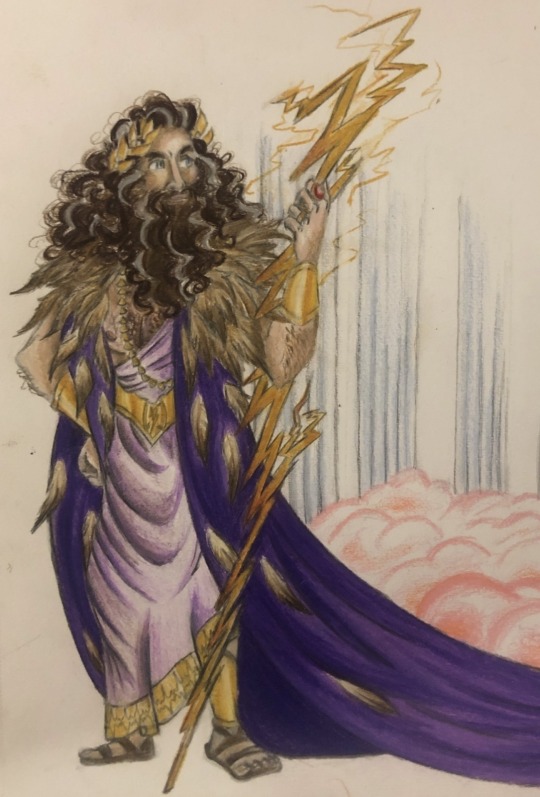
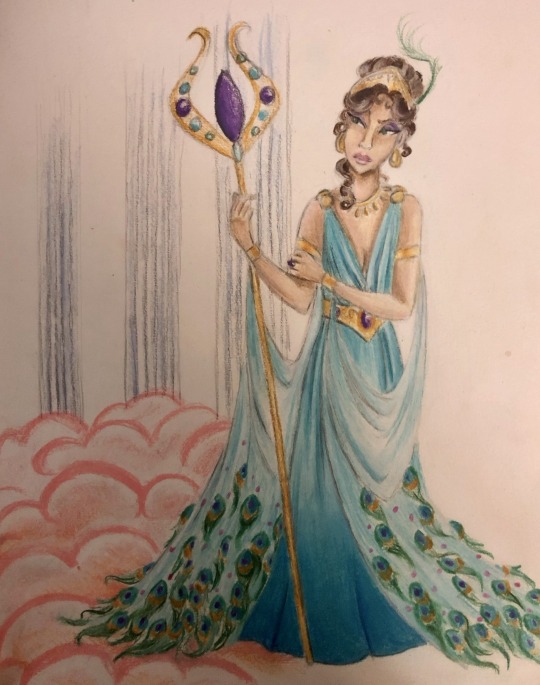
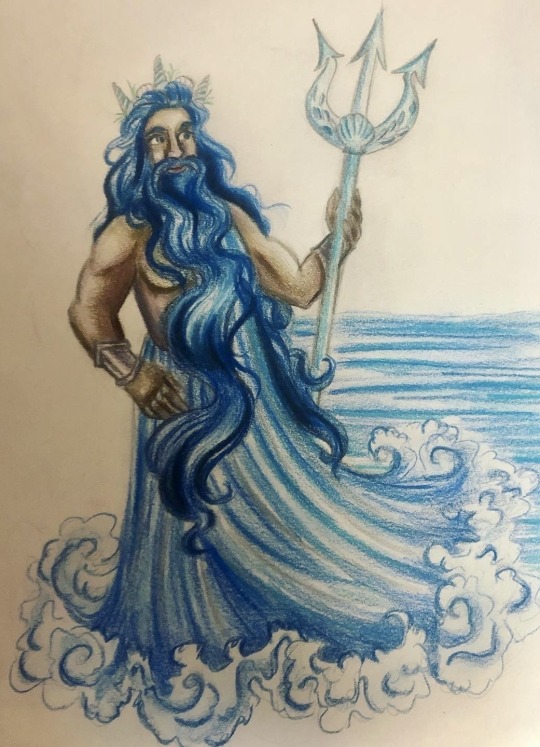
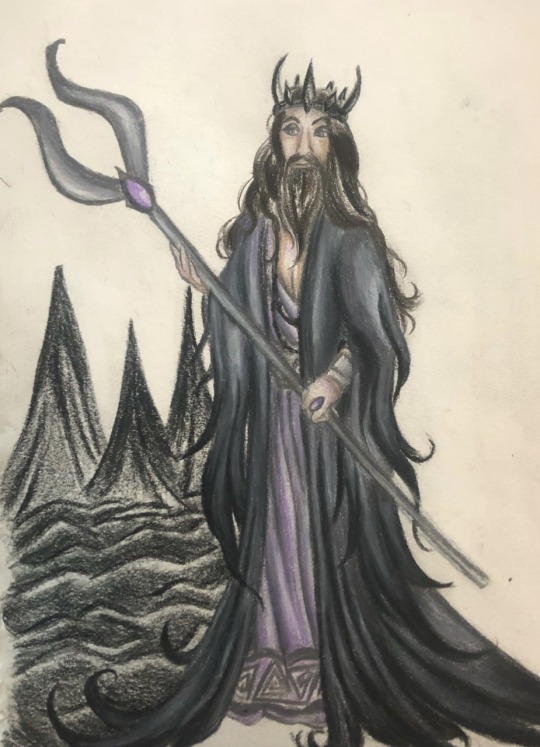
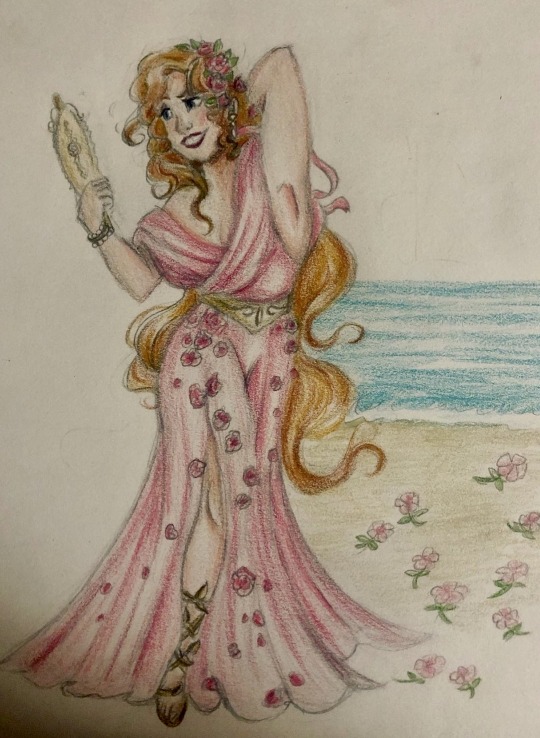
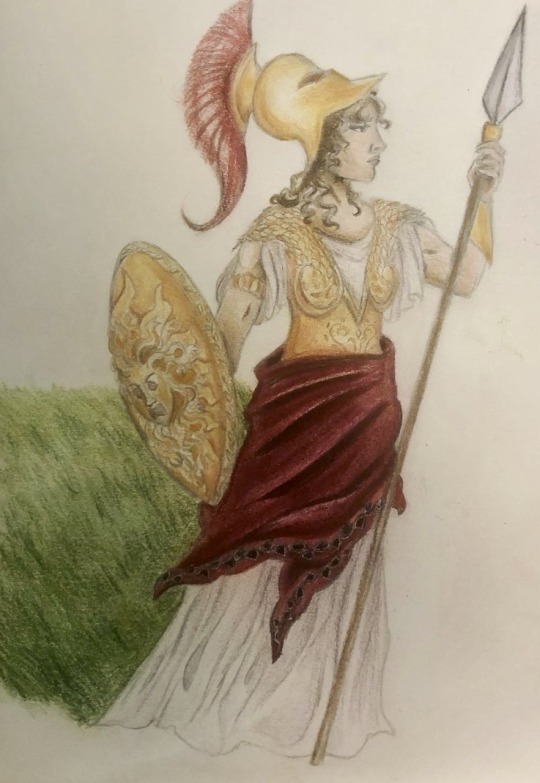



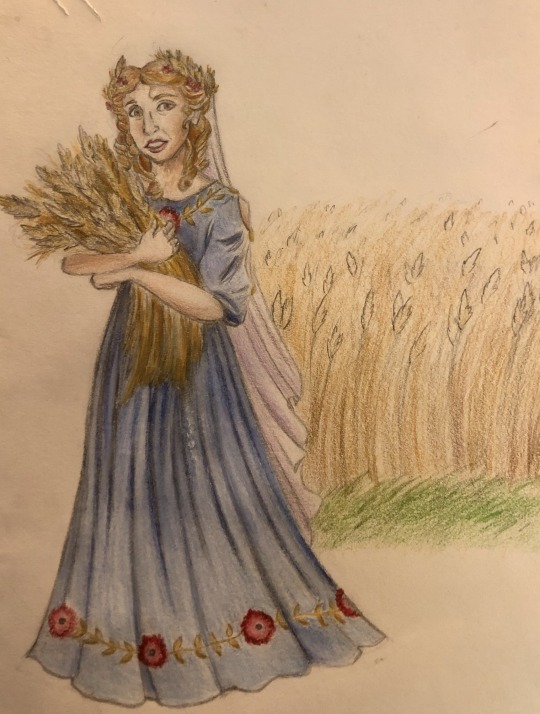
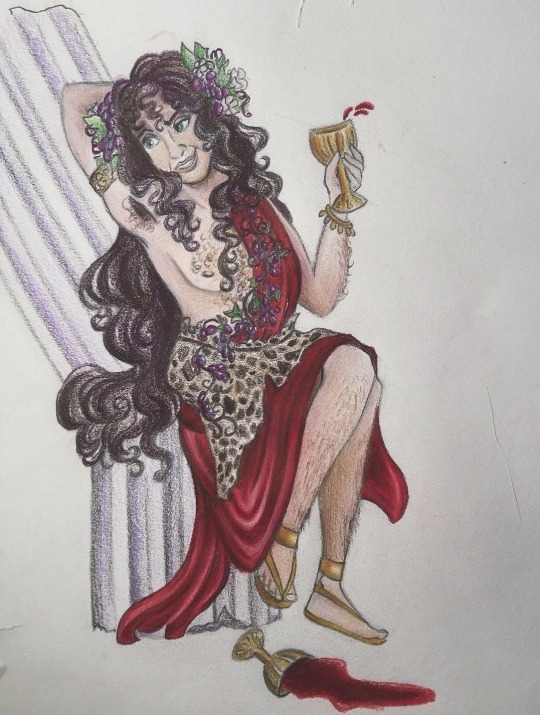
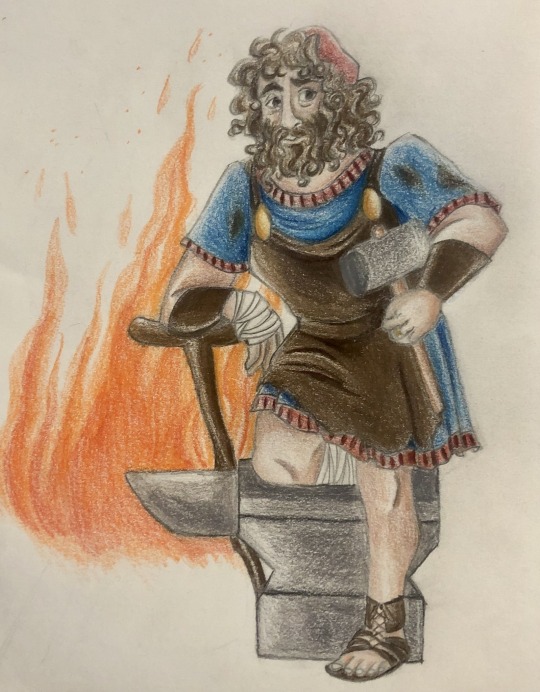
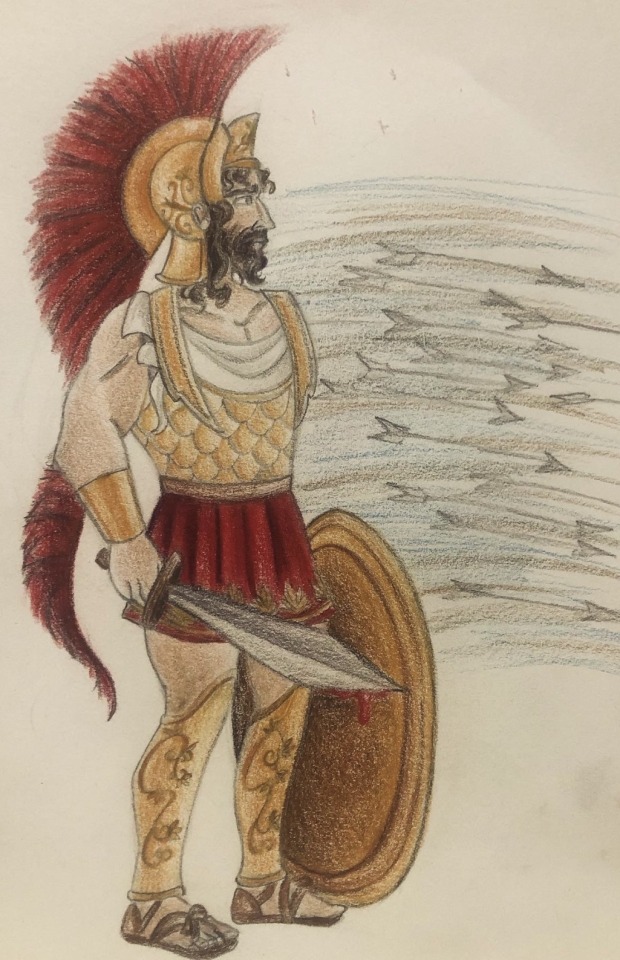
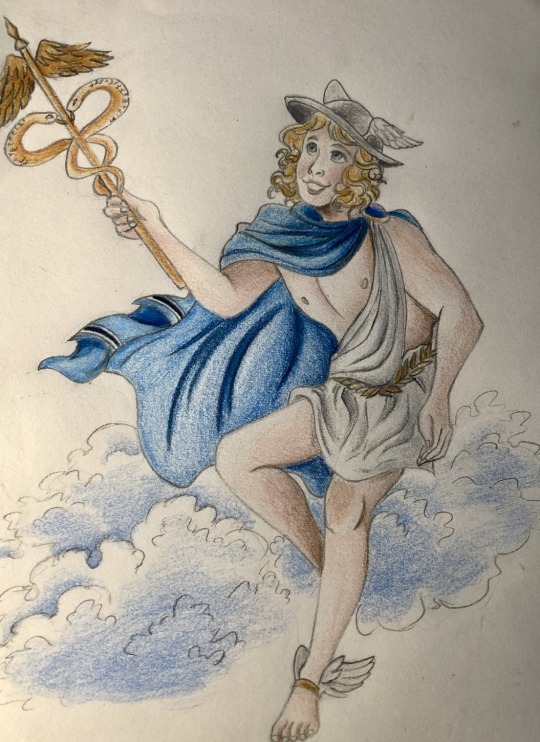

Which one is your favorite?
Commissions info
#my art#angie’s scribbles#greek mythology#greek gods#greek goddesses#greek myth#greek myths#ancient greece#greek mythology art#greek mythology fanart#zeus#hera#poseidon#hades#aphrodite#athena#apollo#artemis#persephone#demeter#dionysus#hephaestus#ares#hermes#hestia#mythology
688 notes
·
View notes
Text


currently obsessed with this gorgeous statue of Melpomene muse of tragedy
Roman statue of Melpomene, 2nd century A.D.
#greek sculpture#greek art#greek gods#greek myth#greek mythology#greek bust#tagamemnon#marble statue#art#historical art#statue#marble bust#melpomene#apollo#greek goddesses#illiad
449 notes
·
View notes
Text
Debunking some misinformation about Hephaestus and Aphrodite’s Marriage
I’m so sick and tired so I’m making a thread, enjoy. I’ll break it down into several points.
1. Hephaestus demanded Aphrodite’s hand in marriage in exchange for Hera’s freedom and Aphrodite was forced into the marriage
You’d be surprised by how this isn’t even attested in ancient sources, rather it’s just a theory made by modern scholars bc of how spotty and limited our knowledge about this marriage is, let’s look at the actual sources:

Notice how Aphrodite isn’t even mentioned mentioned as the “prize”? Hephaestus does ask for a goddess in exchange for freeing Hera, but it’s not Aphrodite, it’s Athena. The usual course of events is this:
Hephaestus is angry at Hera for her mistreatment and sends a golden throne that traps her
The other gods try to persuade him to free her but he refuses
Dionysus convinces him by getting him drunk
Again the theory that Aphrodite was the prize for whoever gets Hephaestus to Olympus is just that, a theory. Not a really good one either bc wouldn’t Aphrodite be married to Dionysus instead? It’s a really shallow portrayal of all figures involved tbh, why would Ares only be interested in freeing his mother if it meant he gets to marry Aphrodite? Why would anyone on Olympus not be worried about their queen being chained up? Believe it or not but Hera isn’t as disliked as one would think lol
Now even if Aphrodite wasn’t a prize how did she end up marrying Hephaestus? And was she forced into doing it? No actually (Lucian’s Dialogue of the gods):

That’s not to say this wasn’t an arranged marriage (it most likely was) but arranged marriage and forced marriage are not the same thing. If you think this is a forced marriage then what about Cadmus and Harmonia? Heracles and Hebe? Both these marriages were arranged by Zeus but no one would claim they’re forced marriages.
2. Aphrodite hated Hephaestus
Now this is more open to interpretation, after all love is subjective, but to say they outright hated each other would be incorrect, there is this myth that Aphrodite cursed Lemnos to have the men abandon their wives and female family members, usually bc they neglected on worshipping her (tho a late Latin source says it’s revenge for exposing her affair).
Apollonius of Rhodes' Argonautica:

However this bit seems to be rather… genuine? Almost as if she might have truly felt bad for what she did and wanted to reconcile, sounds like someone with a deeply messy and complicated relationship with their partner, but not outright hate.
Also there is this moment in Lucian’s Dialogue of the Gods which is pretty funny:

3. Hephaestus only saw Aphrodite as property
Ok I don’t like using the “it was a different time” card but like… it really does apply here lol
Now we’ve already established that Aphrodite was never a prize for Hephaestus to begin with so what about the betrothal gifts he gave to Zeus? Obviously that means he was buying Aphrodite right?

Well, no actually this is a normal part of Ancient Greek marriage (obviously it varied between cities and time periods but it usually goes something like this), the father of the bride and the groom exchange gifts with each other to establish a bond between the two, the bride herself wasn’t the “gift” Zeus’s gift to Hephaestus was most likely his place on Olympus.
To say that Hephaestus bought Aphrodite would mean that Odysseus bought Penelope, or Hector bought Andromache, both are ludicrous claims.
4. Hephaestus is an incel and Ares is this big feminist icon
No, just… no.
Ares was never considered “the protector of women” in Ancient Greece that’s tumblr fanfiction and plenty of other ppl have made posts debunking this (including me) so I won’t repeat that here. Now about Hephaestus being an “incel” all the male Olympians have at least one story where they harm an innocent/defenseless woman, all of them, yes including Ares who persecuted Leto while she was heavily pregnant by Hera’s orders.
5. Aphrodite cheated to “regain her sexuality”
No Patrick, cheating on your disabled spouse with his brother in the bed and palace he made for you is not a girlboss move it’s being an asshole (all the gods are flawed, how thought provoking). Hell, even Zeus wouldn’t pull shit like this with Hera.
Aphrodite and Ares most likely did this hoping it would be the last place anyone would suspect an affair, since Aphrodite could’ve had sex with Ares in his own place or some meadow somewhere but that might cause ppl to be too suspicious.
6. Ares is a big dumb brute who can’t take a hint and only saw Aphrodite for her beauty
Believe it or not, just bc I criticize Aphrodite and Ares doesn’t mean I hate them lol. Now look, all the gods care deeply about looks but that’s not the only thing that Ares and Aphrodite love about each other. Here is Ares being a total simp and actually listening to her:
Iliad book 5

Thebaid book 3

7. Aphrodite felt neglected by Hephaestus bc he’s too busy at the forge
No lol, she straight up works with him at the forge, why wouldn’t she? If anything this claim makes Aphrodite even more shallow than she actually is.
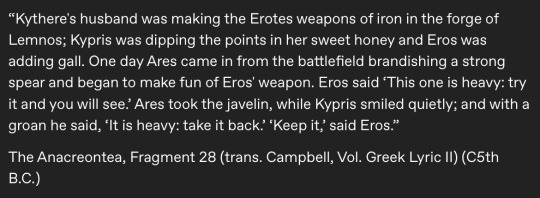
8. Aphrodite and Ares didn’t care about being humiliated in the golden net and Ares straight up brags about cucking his brother
Yes I’ve heard such claims and no Ares and Aphrodite are actually capable of feeling shame lol, almost as if they were in the wrong. Also why would Ares actively antagonize the guy who makes all his stuff? Maybe that’s why Athena keeps beating his ass, bc Hephaestus purposely gives Ares shitty weapons and armor lol

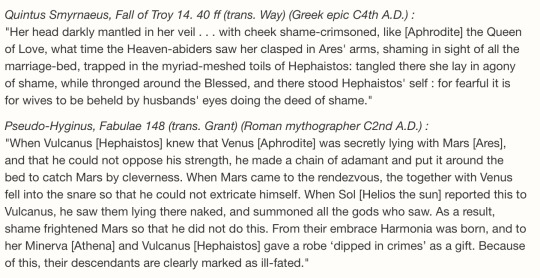
Anyways umm… I think that’s it? Maybe I missed a few things bc I’m frustrated af rn
Just so y’all know, I’m not a scholar I’m just autistic and read a lot lol. I hope I didn’t miss something or get anything wrong.
Have a good day (or night).
#greek mythology#ancient greek mythology#greek pantheon#greek goddess#hephaestus#Aphrodite#ares x aphrodite#aphrodite x hephaestus#aphrodite greek mythology#aphrodite goddess#hephaistos#aglaia#aglaea#zeus#hera#hera goddess#hera deity#hera greek mythology#ares greek god#ares#ares deity#ares god of war#Greek myths#Odysseus#odyssey#greek goddesses#greek myth#greek god#greek gods#Charis
473 notes
·
View notes
Text





Artemis :D
#epic the musical#greek goddesses#artemis#cw: gore#Zeus being weird#Someone neuter Zeus#character design
278 notes
·
View notes
Text
One thing I can't help but wonder.
Artemis is not the only virgin goddess in the Hellenic pantheon. And yet it appears, among modern pagans, virginity is the first (often times only) thing to come to mind whenever Artemis is mentioned. So much is focused around her being a virgin, it's gotten to a point where who she actually is, how she was worshipped in ancient Greece, and her presence in the lives of the ancient Greeks are completely lost among misinformations and misconceptions stemming from only one aspect of her.
For Athena and Hestia, it's always their various roles and domains that people will immediately think about. But for Artemis, it's always her body and marital status, for some reason. It's utterly ridiculous.
Because to the ancient Greeks, Artemis was a perpetually unwed maiden goddess, yes, but she was not the goddess of virginity. According to Stephanie Budin and colleagues, Artemis was the goddess of the hunt and wilderness, and she was responsible for helping women in childbirth, turning children into adults, bringing light, freeing slaves, marking boundaries between territories and periods, bringing and curing plague. Her epithets emphasized her "wild" qualities, expressed her proclivity for the hunt, as well as described her as a "kourotrophos" (child nurturer and protector of the young) and a lunar deity.
It's like, why is it never a problem for everybody to accept that Athena and Hestia had worshippers of all ages, sexes, gender roles, and social statuses throughout ancient times, but it's so hard to wrap minds around this about Artemis.
Artemis, Athena, Hestia, all three goddesses preserve their virginity for important reasons pertaining to their roles in Greek ideology. Artemis's virginity established her position in the divine hierarchy. As the goddess of the wilds and wild animals, she herself could not be tamed (damazo) by sex, as other females in the Greek literature, and especially brides, were said to be (paraphrasing Stephanie Budin, Artemis, 2016).
In a nutshell, these goddesses are virgins and never married because of, as a result of, and due to their personas, functions, their parts in the pantheon and the areas they preside over. They chose the path of virginity because of who they are and what their "jobs" are. It doesn't mean they are rulers of maidenhood and virgins.
#religious ramblings#hellenic polytheism#hellenic pantheon#greek goddesses#deities#ancient greece#ancient greek religion#virgin goddesses#maiden goddesses#artemis#athena#hestia#paganblr#helpolblr#artemis devotee#studyblr#religions#paganism
275 notes
·
View notes
Text
The Olympians Legacy Challenge

22/07/2024: I edited a few things in some of the graphics! Just a few typos and one of the goals for Apollo+Artemis was incomplete, so I fixed it!
All my life I've been fascinated by Greek Mythology and all those Gods and Goddesses. So I think it's very fitting that my first Legacy Challenge ever would be about them! I hope you guys like it and I'd be very happy if anyone does it someday. ❤️
Here you can find the general rules and all the info for each generation!














#the sims 4#legacy challenge#the olympians#the olympians legacy challenge#my legacy challenges#the sims#greek mythology#greek gods#greek goddesses
324 notes
·
View notes
Text
Apollo: *crying* It was so hard! I couldn't take it man!
Artemis: *patting him on the back* Yeah life can be hard sometimes.
Apollo: Life?
#mod m#incorrect quotes#mythology memes#incorrect mythology#incorrect mythology quotes#greek mythology#greek mythology quotes#incorrect greek mythology#incorrect greek gods#greek gods#greek god#apollo#apollon#artemis and apollo#apollo and artemis#greek goddesses#greek goddess#artemis#artemis greek mythology#artemis deity#greek myths#ancient greek mythology#greek myth memes
843 notes
·
View notes
Text
Greek Goddess Legacy Challenge: Generation #1: Gaia, Complete sheets
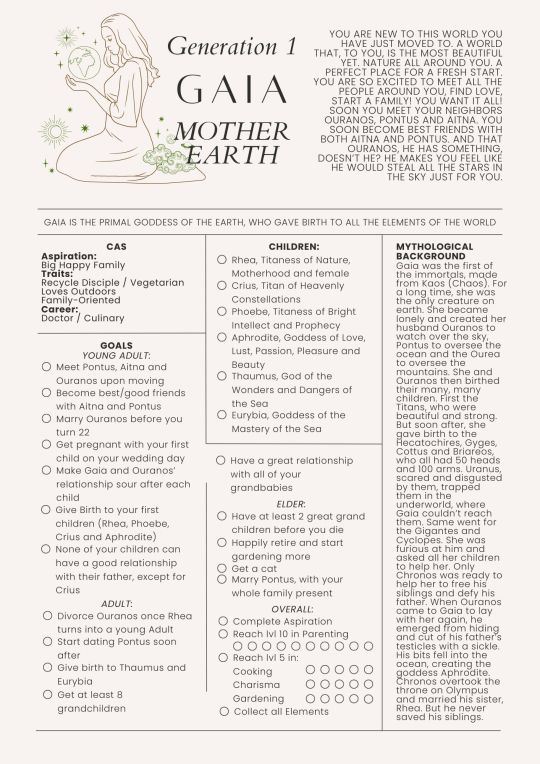
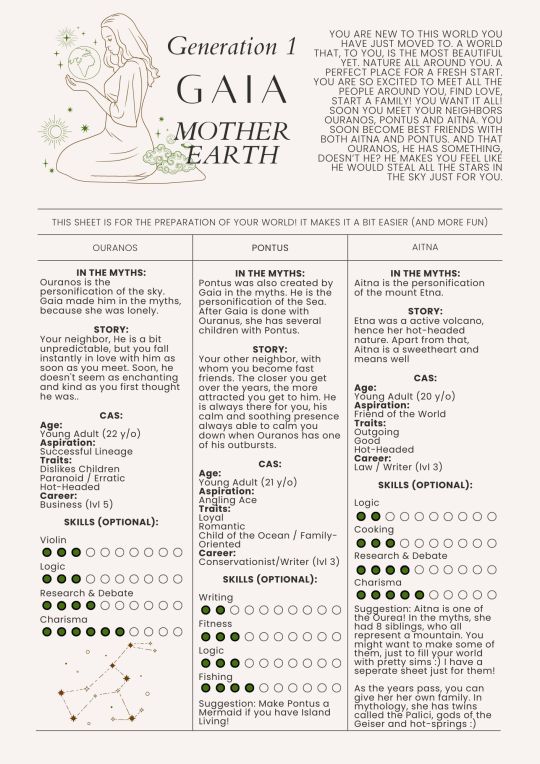
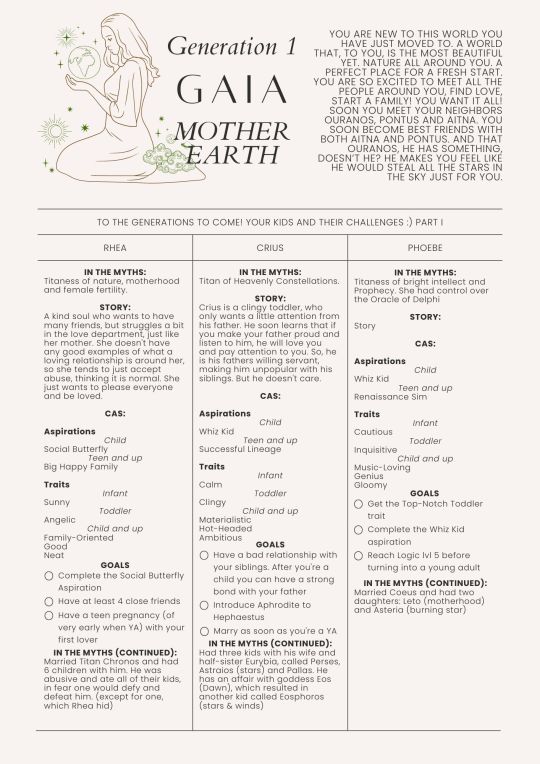
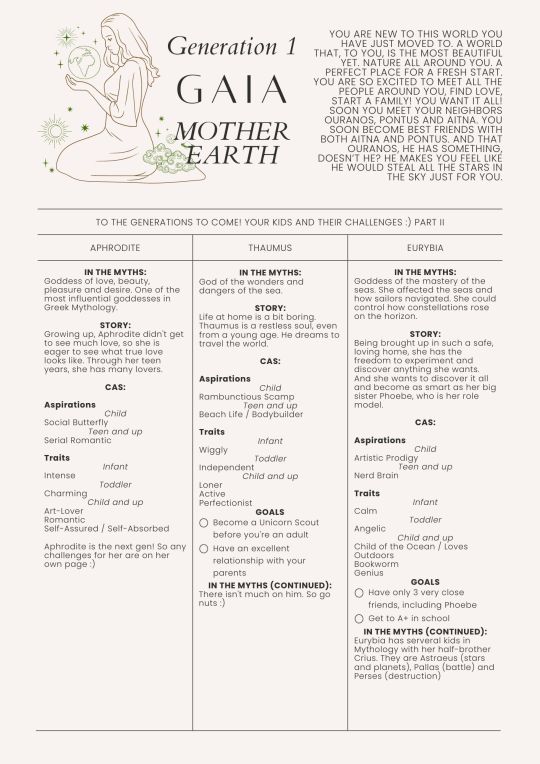

I present to you, the woman who started it all: Gaia! Or, as we know her now, Mother Earth. Enjoy this challenge :)
You are new to this world you have just moved to. A world that, to you, is the most beautiful yet. Nature all around you. A perfect place for a fresh start. You are so excited to meet all the people around you, find love, start a family! You want it all! Soon you meet your neighbors Ouranos, Pontus and Aitna. You soon become best friends with both Aitna and Pontus. And that Ouranos, He has something, doesn’t he? He makes you feel like he would steal all the stars in the sky just for you.
Little bit explanation with the sheets: - First sheet is for describing your current generation, with the challenges you need to do each life-stage. Also, because I love the myths, a bit of mythological background. May it inspire you :) - Second sheet is the preparation sheet for this generation, with important characters for your story. It is technically optional, but I love seeing sims with a backstory in my world, so I would highly recommend it. - Third sheet is for your gens children. They all have their own little challenges if your interested in those. I try to make all of them a bit different from each other, so it doesn't get boring. Your heir is also on this sheet, but I've put their challenges on their own sheets. Stay tuned for those ;) - Fourth sheet is completely optional. If you want sims with names from the myths and love making sims to see them in your world, this is for you! All with a little mythological background ofc, you know me.
Finished Gaia's Challenge? The next generation is Aphrodite! If you want to try her childhood challenges as well, look up her page once she is born :
The Greek Goddesses Challenge by LJJ-Sims is a challenge based on the ancient mythical creatures and stories from Greece. I fell in love with Greek mythology in high school and have not let that love go since. In this challenge you will follow 10 deities in their journey through life. Every goddess has a different take on and goal in life. Special about this challenge? All your kids have little challenges of their own, not only your heir. These challenges are optional, so if you feel like these are too much or just too restricting for you: by all means let them go. I also have sheets for characters that you can make before you start each generation. This gives your challenge a lot more personality and makes it frankly easier and more fun!
A little disclaimer: because I made these gods and goddesses into a legacy challenge, the relationships in the myths don’t exactly match the relationship in this challenge. There is a lot of keep it in the family in mythology, to put it lightly. And apart from the fact that you can’t do that in the Sims, I don’t really like that part. So I didn’t include it, thus the inconsistency. An example: Ares is now Hera’s stepfather instead of her son, which she conceived with her brother and husband Zeus. This inconsistency can also be found in the stories. It’s just based on and not copied exactly, as Sims live lives that are a lot shorter than those of immortal gods. And it takes a way from the creativity if we just copy the myths. Even if we wanted to do that, it’s quite hard, as every myths has its fair share of variations and some are just completely different stories.
I use the MCCC-mod to alter the length of life states. You can find the days-years ratio here: the boring stuff.
#sim#sims#maxis match#sims 4#ljjsims#ljj#ljjchallenge#challenge#sims 4 legacy#ts4 legacy#sims 4 story#sims 4 gameplay#ts4 gameplay#thegreekgoddesslegacychallenge#greek goddesses#greek goddess#greek gods#greek mythology#greek posts#mythology#ancient greece#ancient greek#myth#greek deities#sims 4 challenge#sims challenge#ts4#the sims#the sims 4#gaia
427 notes
·
View notes